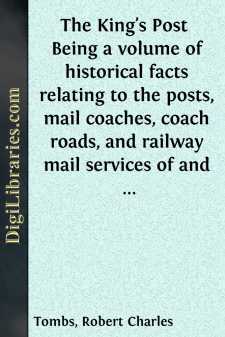Categories
- Antiques & Collectibles 13
- Architecture 36
- Art 48
- Bibles 22
- Biography & Autobiography 813
- Body, Mind & Spirit 142
- Business & Economics 28
- Children's Books 17
- Children's Fiction 14
- Computers 4
- Cooking 94
- Crafts & Hobbies 4
- Drama 346
- Education 46
- Family & Relationships 57
- Fiction 11829
- Games 19
- Gardening 17
- Health & Fitness 34
- History 1377
- House & Home 1
- Humor 147
- Juvenile Fiction 1873
- Juvenile Nonfiction 202
- Language Arts & Disciplines 88
- Law 16
- Literary Collections 686
- Literary Criticism 179
- Mathematics 13
- Medical 41
- Music 40
- Nature 179
- Non-Classifiable 1768
- Performing Arts 7
- Periodicals 1453
- Philosophy 64
- Photography 2
- Poetry 896
- Political Science 203
- Psychology 42
- Reference 154
- Religion 513
- Science 126
- Self-Help 84
- Social Science 81
- Sports & Recreation 34
- Study Aids 3
- Technology & Engineering 59
- Transportation 23
- Travel 463
- True Crime 29
The King's Post Being a volume of historical facts relating to the posts, mail coaches, coach roads, and railway mail services of and connected with the ancient city of Bristol from 1580 to the present time
Categories:
Description:
Excerpt
CHAPTER I.
THE EARLIEST BRISTOL POSTS, 1580.—FOOT AND RUNNING POSTS.—THE FIRST BRISTOL POSTMASTERS: ALLEN AND TEAGUE, 1644-1660.—THE POST HOUSE.—EARLIEST LETTERS, 1662.
The difficulty in Queen Elizabeth's time of communicating with persons at a distance from Bristol before the establishment of a post office is illustrated by the following item from the City Chamberlain's accounts:—
"1580, August. Paid to Savage, the foot post, to go to Wellington with a letter to the Recorder touching the holding of the Sessions, and if not there to go to Wimborne Minster, where he has a house, where he found him, and returned with a letter; which post was six days upon that journey in very foul weather, and I paid him for his pains 13s. 4d."
The next record of a person performing postman's work in Bristol is that of 1615, when the City Chamberlain paid a tradesman 12s. "for cloth to make Packer, the foot post, a coat." In 1616, Packer was sent by the same official to Brewham to collect rents, and was paid 3s. 8d. for a journey, out and home, of 60 miles. This system of a foot post to collect money in King James the First's reign appears to be an early application of the somewhat analogous plan, which of recent years has been under departmental consideration as "C.O.D.," or collection of business and trade charges by the postman on delivery of parcels—an exemplification of there being nothing new under the sun!
That travelling and the conveyance of letters was difficult in 1626 is evident from the fact that nearly £60 was spent in setting up wooden posts along the highway and causeway at Kingswood, for the guidance of travellers, the tracks being then unenclosed, so that the "foot post" must have had no enviable task on his journeys. In October, 1637, John Freeman was appointed "thorough post" at Bristol, and ordered to provide horses for all men riding post on the King's affairs of King Charles I: Letters were not to be detained more than half a quarter of an hour, and the carriers were to run seven miles an hour in summer, and five in winter. A Government "running post" from London to Bristol and other towns was ordered on July 31st, 1638. No messengers were thenceforth to run to and from Bristol except those appointed by Thomas Withering, but letters were allowed to be sent by common carriers, or by private messengers passing between friends. The postage was fixed at twopence for under 80 miles, and at fourpence for under 140 miles.
In 1644 Lord Hopton "commanded" the grant of the freedom of Bristol to one Richard Allen, "Postmaster-General." In August, 1643, Lord Hopton was appointed Lieutenant-Governor of Bristol, and held that appointment until 1645, when Fairfax took the city. Probably Allen was Postmaster-General of Bristol, and his authority may have extended to other parts of the country that were held by the King's forces. Prideaux was appointed Master of the Posts by Parliament, and his jurisdiction extended as far as the country was under the control of Parliament, as distinguished from such parts of England as adhered to the King....



